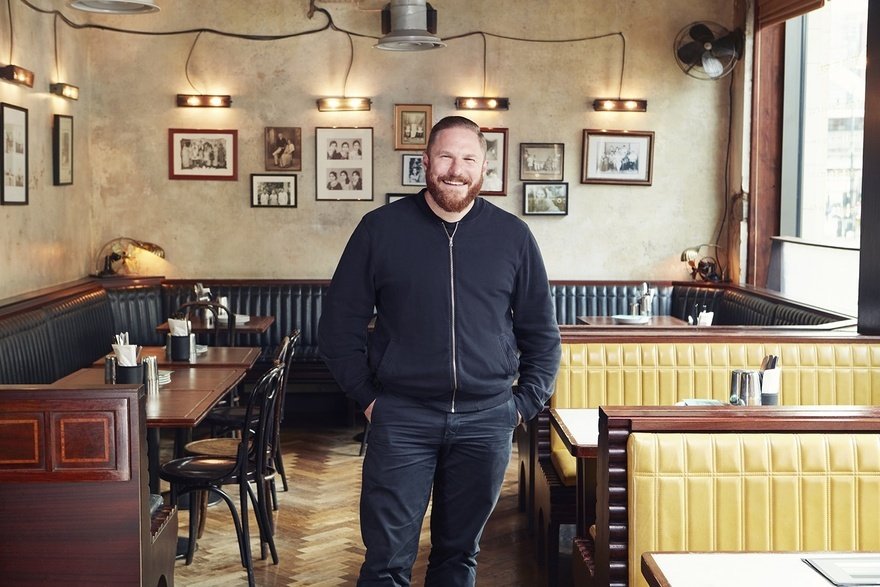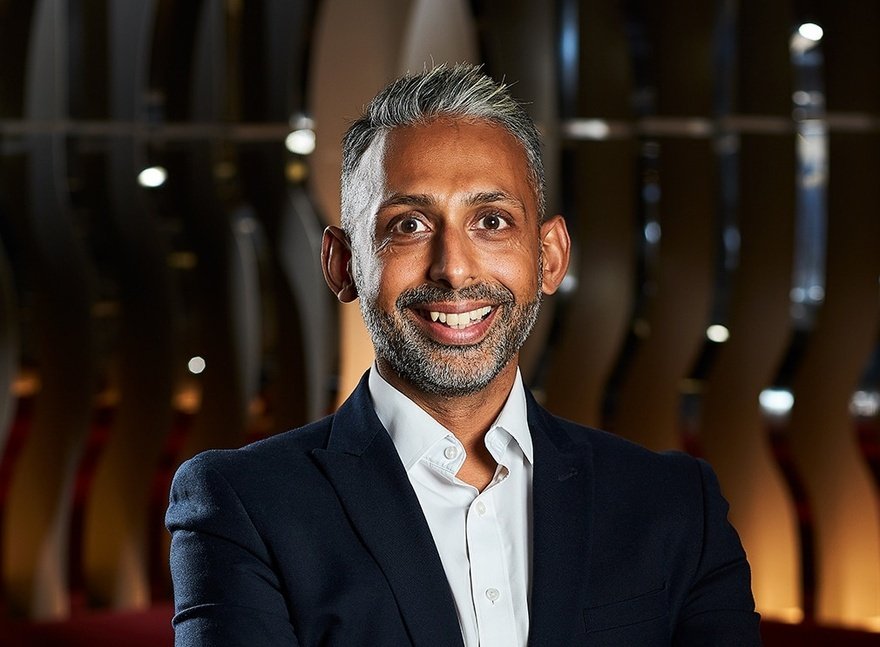The revenue streams that will drive hospitality in 2021
The Recovery Summit gathered advice from across the industry, discovering how pandemic pivots can be made permanent and identifying the revenue generators of the future. Kathleen Hall reports.
A number of leading hospitality businesses are intending to keep the spin-off innovations they developed during lockdown. From at-home meal kits to car park ‘beach bars', the industry has shown its resilience time and time again by launching new revenue models to keep trading. These innovations were discussed by industry experts during the Recovery Summit on 30 March, which was organised by The Caterer and sponsored by OpenTable, Sandton Capital Partners and Wi5.
Since pivoting to selling his hugely successful food boxes, Tommy Banks, chef-director of the Black Swan at Oldstead in North Yorkshire, has developed a novel way of ensuring the packaging he uses for delivery is robust, as he told the audience in the first panel discussion of the day.
"I got a really good piece of advice from a guy, who said: ‘what you should do is put all your food into the box, package it up, and then just boot it from one side of the kitchen to the other. If it survives, you know it should be alright!' And that is literally what we do every week."
The Black Swan's food boxes have been in huge demand and went nationwide in June last year, with 32 people working on the meal kits. This business model also offers more flexible hours for staff.
"We've been able to create Monday to Friday jobs, which have been really appealing to our members of staff who might be looking to start a family," said Banks. "I think any sort of diversification we've made since the pandemic could create more sustainable jobs for highly skilled people who just need a better work-life balance."
Dishoom has also been on "an enormous journey", going from "not being in the e-commerce business at all" to creating kitchens specifically designed to dispatch its iconic bacon naan and vegan sausage roll meal kits, said Brian Trollip, managing director at Dishoom.
Although he can't be certain whether the service will continue as things return to normality, "we'd like to, but I think anyone who can tell you what the world is going to look like post-lockdown is stretching the truth a bit. But we love the product and people seem to really enjoy it, and if we can continue post- reopening, we'd love to carry on."
Let's go outside
As hospitality prepares to open for outside entertainment next month, a number of businesses have already started to think outside the box.
In a session on novel revenue generators, Debrah Dhugga, chief operating officer of the Apartment Group, related how she is transforming some of the group's car parks into outdoor drinking and dining venues called Beach Box.
"When we come out of lockdown on 12 April, we are opening our second one, and I'm in the middle of securing a site for another," she said. "We make more money out of Beach Box than we ever did out of a car park! Beach Box will be staying."
Prior to the pandemic Sam Morgan, chief executive at We Are Craft, had begun introducing private dining pods. And as the business readies itself for reopening, they are already fully booked for the next three months. He estimated that return on investment to be around 10 days. "The demand is so significant, that even on a day like Wednesday, which was not traditionally a very busy day for Birmingham city centre, we are full for lunch and dinner."
One thing Morgan learned prior to the pandemic was the importance of reducing lost revenue from no-shows. "Our business was losing approximately £480,000 a year on no-show revenue," he said. By introducing a ticketing and deposit system the no-show rate fell from 26% to 0.8%.
Star tech
Gavin Peters, chief marketing and strategy officer at mobile and online ordering company Wi5, noted that there has been a huge amount of innovation born out of necessity during the last 12 months, but believed that there is scope for hospitality to do even more.
"As people are moving to this e-commerce world, they are now starting to see the benefit of what digitisation can look like," he said. That includes upselling to customers, cutting costs, automation and personalisation. Over the coming months and years, the sector will realise technology offers more than a new service channel, "but a way of engaging customers and a new way of optimising their business," he added.
As people are moving to this e-commerce world, they are now starting to see the benefit of what digitisation can look like
Indeed, technology will be a huge factor in the continued recovery of the industry as consumers and operators navigate loosening restrictions as per the government's roadmap. During another panel discussion at the summit, operators said it was crucial to give consumers a choice in how they decide to interact with venues.
According to research from OpenTable, 72% of customers are now looking to book online, said Lucy Taylor, vice-president of global sales and services. "I think once people have adopted certain behaviour they carry on," she said. "Operators don't want to be thinking about tech, they want to be thinking about hospitality."
Operators don't want to be thinking about tech, they want to be thinking about hospitality
Edwardian Hotels London is no stranger to using technology to complement its customer service experience, having created a virtual host called ‘Edward', which guests can text for assistance, and won the hotel group the Best Use of Technology Catey last year. Alice Chiplin, group services operations manager, said: "The key with Edward is he's there to assist with high-volume, repeat questions, which frees real-life hosts to service guests for those bespoke personalised interactions."
The service is so successful that guests aren't aware they're interacting with a chatbot. "Guests have tried to tip Edward, we've had an Edward proposal, and many people have asked if he has a girlfriend!"
But as operators look to reopen, Chiplin believes the key will be offering customers a variety of different channels to communicate through, for instance offering both mobile ordering as well as ordering at the bar.
"It's important you offer your guests a choice. I think there will be people who want to continue to order [on their phones], but I also think people will want to go up to the bar and have a real-life interaction… We've seen that with online check in, which we had before Covid," she said.
Mark Selby, co-founder of Wahaca, agreed. "We believe there will be people who still want to have that impromptu eat out [experience]. So we are very keen to hold back bookings to enable that. But we are also conscious people are going to want to book [online]."
Like Edwardian Hotels, the operator has also developed its own in-house technology to enhance the customer experience – in the form of an augmented reality waiter to help customers explore the menu. The key question on every technology implementation is: "Is it going to enhance the customer experience?" He said the point about the virtual waiter is it's something staff can showcase, rather than feel threatened by.
Covid has fast-forwarded a lot of innovations in the industry, he said. "But I think it is important for operators to gauge where they sit and use technology to enhance that."
Rak Kalidas, commercial director at stadium event business Levy UK, had already been implementing technology to better support its venues. "The biggest pinch-point in stadiums is the queues," he said. That began with putting in an effective electronic point of sale system and things like digital screens to help speed up decision-making, as well as introducing cashless payments early on.
Introducing self-ordering screens can make the experience slicker and also improve the customer experience given by serving staff. "They can be hospitality staff because they are not under pressure to sell any more," he said.
He also believes that ordering via apps is becoming a way of life. "We are looking at how we ingrain that in the customer experience." But the customer experience must always come first. "We've got to be really true to our form that we don't put tech in for tech's sake."
OpenTable's Taylor agreed that it is all about choice. "I think ultimately it's about offering diners what they want. Tech can do that. If you don't want to queue: add yourself to a wait list. If you want to book, book," she said. "Ultimately, it's what we offer to diners in line with what they want."
How businesses can finance their way out of the pandemic
Andy Foster, senior advisor at investment fund Sandton Capital Partners, answered the burning questions on how to raise cash to aid hospitality's recovery
Why do businesses need to think about raising cash now?
Statistically, more businesses fail on their way out of a recession than on the way in or during, and that is exaggerated if the recovery itself is sudden. So cash becomes absolutely key in oiling the working capital requirements of businesses. A recent statement suggests there's about £200b of pent-up savings out there, of which around 25% could get spent very quickly.
What options are available to raise cash for recovery?
There's a spectrum [of choices] from creditor deposits, supplier help, debt around the middle – leading to more expensive but more reliable funding in the shape of equities. The choice as to which one they should make use of depends on availability and their ability to repay even more debt, but also the extent to which an equity provider has just as much to lose in the business as the owner and has a vested interest in seeing [its] ongoing success because they themselves have a share in it.
What are the pros and cons of the new business recovery loan scheme?
Bounce Back Loan Schemes and Coronavirus Business Interruption Loan Schemes are coming to an end [on 31 March]; they are to be replaced by the recovery loan scheme, which in some ways is slightly better – there's a larger amount available: £10m as opposed to £6m previously. That too is 80% guaranteed. But the downside to the new scheme is, unlike CBILS and Bounce Back, there is no 12-month interest holiday. A lot of these schemes are coming up to their 12-month anniversary, which means a lot of businesses are going to have to start servicing the debt. But nevertheless, given interest rates are what they are, these look like attractive options, if the business has sufficient capacity to repay them.
Are companies in danger of reaching an unsustainable level of debt?
There is some evidence to suggest we do have unsustainable levels of debts. Current corporate debt is growing twice the level this year than it ever has in the past… This is [also] a sector that could see a big increase in inflation, particularly in the UK.
And if inflation takes off, which it could do given the bounce back we're talking about, the only way governments have been able to control that is through tax or interest rates. And for the latter: that's when the debt burden could really come back to bite.
What are the other options to fund working capital?
It is really important that people financially forecast those order books and those pre-bookings they already have and seek the advice of a sounding board or trusted advisor... This can be a lonely place for owner-managers.
Also given the scale of reliance on HMRC and landlords, as soon as that forbearance is lifted, it is very important we think that you've started the dialogue with those two key creditors. And going back to the value of equity in these situations, it does mean it can be a problem shared.
How to raise funds without borrowing
Andy Ley, corporate partner at law firm Addleshaw Goddard, gave his top tips on how to raise funds without getting into more debt
Diversification
"[Diversification] is essentially using your complementary skills and assets to drive new revenue," said Ley. "We've definitely seen it across our client base in the shape of products and services, route to market and digitisation and in relation to supply chains. And the interesting thing is a lot of that should stick."
Tapping into any number of consumer trends – such as a focus on health and wellness and sustainability as well as an increase in brands selling direct to the consumer – can be key to raising capital. "We are obviously very interested in those insights because they are areas where you can look at raising money or look at creating a revenue stream and a business that lenders will lend to and investors will invest in. Particularly if it's felt that it's forward-looking and ‘on trend'," he said. "Diversification has been incredibly relevant for the last 12 months, remains relevant now and funding is inextricably linked to it."
Fund raising
A number of businesses have been quick to use the stock market to raise cash. "I helped City Pub Group raise £22m on AIM in March last year. We've seen a host of others follow suit and it leaves them well-positioned now as we're coming into recovery."
But for a number of businesses equity funding might not be as easy, he said. Instead, businesses could look into crowdfunding, with things like membership schemes having become particularly popular.
"One example is the Buffalo Farm, which has been building Scotland's first mozzarella factory. We raised the money by creating a membership scheme, with founder members paying a joining fee and in return they get some product every year and involvement in the business."
This type of model is a lot easier to implement than equity fund-raising. It's less heavily regulated and has less of a long-term impact of the shareholders of the company.
Review assets
Businesses should not underestimate the value of their intellectual property. This can be created in all sorts of ways by a company, such as through the brand itself, the look and feel of a website, or even software created in-house – such as a booking and ordering system, or information on databases.
"It's everything that is not a tangible asset," he said. Ensuring the IP is valued correctly can help make your business a more attractive proposition.
"We think less than 5% of companies put the true value of IP on their balance sheet. And they don't leverage it properly – it is a completely untapped asset. So there's a lot you can do just by doing a proper IP review… and there's a lot of IP being generated [at the moment] – it's just not being turned into cash."
Consumers have already planned their first outing, says CGA
Nearly 40% of consumers are planning to dine out from 12 April and have already started to make reservations, according to research by CGA.
By the end of April, as more people have been vaccinated, that figure will climb to 76% and rise to 81% by June, said Karl Chessell, director at CGA, speaking at the Recovery Summit.
"People want to return to the sector and we will see that pent-up demand manifesting itself," he said. That will lead to a significant bounce-back for the sector in the second half of the year.
High-quality, healthy and locally produced options will be a priority for consumers, rather than cost, he added.
"That is what consumers have missed. You can't ignore the fact there are economic pressures for parts of the population… but I think really people have missed the experience, the quality, the service and that's what consumers are focused on, rather than price. Which is a good place for the sector to be."
People have missed the experience, the quality, the service – that's what consumers are focused on, rather than price
According to CGA, 58% of business leaders plan to open sites in next 12 months. Respondents were mainly larger operators, with those planning to open an average of four new sites. "We will see new investment in the sector and people looking to expand their estates," he said.
Overall, there was a net decline of 7,592 of licensed premises in 2020.
"We are going to see more closures, but we are hopefully going to see new openings and new entrants into the market," he added.
The main areas of growth will be restaurant openings and pubs – particularly those which are food-led. "That balance over time has been more towards food and less towards wet-led pubs. And certainly the operators that are doing well will do both well in combination."


















